It’s the time of year for consultant Drew McManus to produce his annual compensation reports on US orchestras. Today it’s executive directors, tomorrow music directors.
The data are based on tax returns for 2011/12 and are therefore a little behind the times, before the Minnesota debacle.
Average chief executive wages rose 5.81 percent in the 2011/12 season.
The top three executives earned:
1 Los Angeles Philharmonic (including Hollywood Bowl): $1,751,039
2 New York Philharmonic: $912,858
3 San Francisco Symphony: $638,857
Read all the rest right here.

Peter Gelb at the Met, by comparison, is on $1.8 million this year.
Laven Sowell died last November, aged 80, having given 34 years of his life to Tulsa Opera as its chorusmaster.
Today, it emerged that he had left the company a handsome $600,000 foundation. Story here.

It’s no secret that most pop singing is fake. The producers fiddle around to keep the stuff generally in tune.
Evidence of their ma nipulation has landed in the form of a leaked video of Britney Spears singing without the benefit of computerised voice correction. You don’t need to listen to much. It’s horrible.

The producer William Orbit, who worked with Spears, has published an excuse on Facebook: ‘I have heard that Britney vocal link that everybody’s been discussing. It has been impossible not to… I’d like to affirm that ANY singer when first at the mic at the start of a long session can make a multitude of vocalisations in order to get warmed up.’
Oh, yeah?
This ought to be the moment for the world to acknowledge the extreme thrill and high risk that opera singers deliver every night.
Will it? Probably not. The world is deaf and is constantly being dumbed down.
Here’s the full text of Orbit’s statement:
Dearest Music Lovers, I have heard that Britney vocal link that everybody’s been discussing. It has been impossible not to as there have been many comments directing my attention to it. [I won’t re-posting it here]. I’d like to affirm that ANY singer when first at the mic at the start of a long session can make a multitude of vocalisations in order to get warmed up.
Warming up is essential if you’re a pro, as it is with a runner doing stretches, and it takes a while to do properly. I’ve heard all manner of sounds emitted during warmups. The point is that it is not supposed to be shared with millions of listeners.
A generous singer will put something down the mic to help the engineer get their systems warmed up and at the right level, maybe whilst having a cup of herb tea and checking through lyrics before the session really kicks off. It’s not expected to be a ‘take’.
I think that 99% of you reading this will totally understand.
Whomever put this on the internet must have done so in a spirit of unkindness, but it can in no way detract from the fact that Britney is and always will be beyond Stellar! She is magnificent! And that’s that.
Sincerely, William
The Berlin radio chorus walked out today on its first strike in 89 years, forcing the cancellation of a Brahms German Requiem recording.
The chorus has not received a pay rise in ten years and has been out of contract since 1993. Enough was enough.
The strike is indefinite. The radio chorus works regularly with the Berlin Philharmonic Orchestra.
More here.

Nielsen Soundscan reports that foru million LPs have sold in the US since January. They’re predicting 8.3 million for the year.
The bad news? Vinyl is the only format that’s up.

Six weeks ago, we discussed on Slipped Disc one of the persistent slurs on the great violinist Isaac Stern – that he used his prestige and power to disable some of his American rivals. On the evidence available, we determined that this was unlikely.
That conclusion drew us into a renewed correspondence with the outstanding violinist, Aaron Rosand. Aaron maintains his career was blighted by Stern. We asked for evidence.
Aaron sat down and wrote the following memoir for www.slippedisc.com. It contains uncomfortable reminiscences. Read objectively, it reveals a complex, contentious relationship, founded on a degree of mutual respect. Read on, share this post (and respect the copyright notice at the foot of the page). This memoir offers a vital insight into the inner workings of the American strings world.
Aaron begins: ‘I have kept this to myself for too many years. Again I want to thank you for your article that incited my bitter memories of the unknown Isaac Stern who did as much harm as he did good.’
UPDATE: Artist claims Stern tried to expel him from US. Click here.
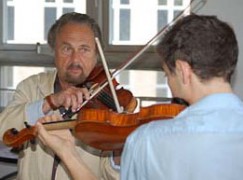
My Life with Isaac Stern
by Aaron Rosand
Max Adler (a wealthy benefactor) introduced me to Isaac in 1946 in his Chicago home and played a recorded live performance of Tchaikovsky concerto that I had done with the Louisville Symphony. He seemed impressed but couldn’t resist making critical comments. We kept in touch, and I visited him in Hollywood later that year after a concert that I played in Tulare, CA. He was doing the musical background for the movie “Humoresque” that was a big break for his career. Heifetz was the first call, but he asked for $150,000.00. Isaac got the chance for $7,500.
I was introduced to Franz Waxman, who wrote the musical score for the movie, in Isaac’s rented home (formerly the home of Marilyn Davies). Waxman heard me perform soon afterwards and proposed a plan to record four Russian concertos; Tchaikovsky, Glazunov, Khachaturian, and Khrennikov, with the Leningrad Philharmonic that he was going to conduct the following year. His idea was for an American violinist to be the first to record with a Russian orchestra after the war, perhaps a good will gesture. When Isaac learned of this, he informed Sol Hurok who immediately scuttled the plan on the grounds that he was presenting the orchestra on tour and that he would cancel the tour if they did not use one of his artists.
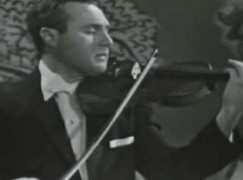
In 1950, I secretly married Eileen Flissler. She was a brilliant pianist and can be heard in our early recordings of the Beethoven and Brahms complete. On occasion, we visited and performed in Stern’s New York apartment where he had frequent musical gatherings. Isaac was very envious of our relationship and informed Max Adler of our marriage. Adler who had (other) ideas for me and his granddaughter promptly cut his support. I had to give up the violin that he had loaned to Rembert Wurlitzer, a New York violin dealer. Wurlitzer was very kind to me for the next six years in letting me use great violins that kept me going.
In 1951, Issac married Vera Lindenblit, who came to America to promote Israeli bonds. He used this connection to his advantage in making contact with the wealthy Jewish community, many of whom were sitting on the boards of major orchestras and in Hollywood.
Several years went by when I did not see or contact him. In 1956, needing a violin that I could call my voice, I ventured to buy the ex-Kochanski Guarnerius. It was considered one of the best violins in existence. I was too proud and unsuccessful as a fundraiser and set my mind to do it by myself. In order to get bank credit, I needed a steady salary, and I accepted a position for the CBS Broadcasting Network that guaranteed a weekly paycheck and gave me free time to continue my concert career. Shumsky, Ricci, Spivakovsky, Mischakoff did the same for other networks. My first bank call was to the Chase Manhattan bank where I personally knew the vice president Frederic R. Mann from my students days at the Curtis Institute. He was dating a harp player who happened to be the best friend of my first wife. We shared many interesting evenings together. This, by the way, is the Frederic R Mann of the FRM Auditorium in Tel Aviv Israel.
His immediate response to my call was “Sure Aaron I will call you back in an hour.” He called me back in a rage using unprintable language saying that “Isaac wants that violin and I am not going to help you.” And so, I began to understand the real Godfather in support of Israeli Artists.
In 1957, a surprise call from Isaac inquiring if I had read an article in the NY Times the previous day, concerning the first Tchaikovsky competition to be held in Moscow in 1958. The article mentioned that any American artist who could pass the first stage would have expenses paid by the Rusian government. Isaac said that there was a committee meeting, and it was decided that I would be the logical candidate to be sent to the competition. Isaac had already organized a music advisory board that consisted of John Majeski of Musical America, William Schuman Director of the Juilliard School and other prominent musical figures. I told Isaac that I was over age in 1958. The age limit was 30 and I would be 31. “No concern” was his reply.
“We will fix your passport. We know that you are working for CBS and we’ll pay your salary for three months if you just stay at home and practice with Eileen prior to the competition date. I’ll coach you during that time.” I thanked him for the offer but turned it down, not
wanting to hurt my career if I did not win a first prize. I recollect that the majority of judges were Russian, and I did not think the competition would be fair.
The Ford Foundation Grant in 1959; according to two eyewitnesses at a meeting to give grants to American artists, my name was high on the list. When my name came up Isaac Stern who by this time was a master spokesperson and sitting on many boards, announced that I had gone commercial in working for CBS and not worthy of an award. The witnesses were Marks Levine director of National Concert and Artist Corporation and John Majeski who related the incident to me and were shocked, because they considered Isaac to be my friend. I lost the opportunity to premiere an American composer concerto (to be determined) with several major orchestras.

In 1960, my New York premiere of Samuel Barber’s concerto with the NY Philharmonic – Leonard Bernstein had chosen me to be one of the first soloists of his tenure as conductor of the NY Philharmonic. Being an American he thought it fitting that I do the Barber, which was relatively unknown at the time. He planned to record it with me five to six weeks after the concert. A fuming Isaac Stern was waiting in the wings when we walked off stage after the first performance. He never shook my hand, grabbed Bernstein and took him to his dressingroom. I walked out alone for the bows and from then on Bernstein attitude towards me changed. Isaac hurriedly learned the concerto and recorded it five weeks later for Columbia Records. The entire orchestra knew about this and spread the word “earn with Stern” as Isaac always went overtime in sessions that he paid for. Isaac did his own editing and splicing to correct his intonation. The Beethoven for example had close to 400 splices a fact well known in the recording business.
Leonard Bernstein apologized to me 25 years later over several glasses of Scotch. We participated in a Curtis Institute Anniversary concert in 1986. He told me that Isaac had threatened to cancel his five concerto recordings with the NY Philharmonic if he recorded the Barber concerto with me. In 1961, my career began to move forward with major orchestral engagements and conductors such as Vladimir Golshman, Izler Solomon,Blomstedt, Walter Hendl, etc. Peculiarly, at gatherings after concerts, conductors and board members always mentioned that Isaac Stern had called that day to send regards. Isaac knew my exact schedule and in his own clever way tried to poison my success by saying that I had become commercial. His faint praise was very damaging with many noted conductors.
Around this time I came to know Henryk Szeryng, and through my good friend Sheldon Gold, who was working for Sol Hurok, I was able to salvage his career in America. Hurok was going to drop him from his roster, undoubtedly through the instigation of Issac Stern, and I was able to convince Sheldon that Szeryng was one of the great players of our time. Sheldon Gold kept him going and Szeryng repaid me by introducing me to his manager Maurice Dandelot, one of the premier impresarios in Europe. It was a prophecy fulfilled as Nathan Milstein seven to eight years earlier had told me to go to Europe to be appreciated. In his words, “You are too good violinist but you are American and will not be recognized here. Go to Vienna and you will be king in ten years.”
1962-1975 I had a very busy concert career in Europe. During this period I had another call from Columbia Records. Two of the producers, Tom Frost, and Lou (?) decided that I should do a virtuoso disc that would be called “The Relentless Virtuoso”. Once again, Isaac interfered and promoted Pinchas Zukerman who was just beginning his career in America. The project was abandoned and the only disc I ever made for Columbia was in an album of black composers which I recorded< with the London Symphony Orchestra in 1975. It is a very difficult technical work similar to Wieniawski’s F Sharp Minor Concerto that both Stern and Zukerman would not attempt to play.
I rarely encountered Isaac for a number of years. In the early 80s I was on tour in Korea and went to an embarrassing performance in Seoul of Isaac playing the Mendelssohn Concerto with the orchestra. Seeing him backstage really surprised him, and he was full of excuses and
apologetic for his poor performance. There were several large gatherings where we crossed paths and he was unfriendly. Then one day, years later, out of the blue he called me in a tone of voice that I had never heard from him, to say that he had never done anything to hurt me and that I had hurt myself. It was a lengthy call, very unlike him, in an attempt to atone for all the harm he had perpetrated over the years.
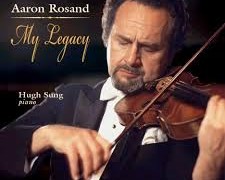
I have never disclosed what I am writing to you. It would only have sounded like sour grapes and bitterness. But as you asked for my history with Isaac Stern I feel it necessary to speak the truth and clear my conscience.
Isaac was a powerful player, and a superb musician with a beautiful tone. He did not have a virtuoso technique but whatever he did was convincing in bull like fashion. He was extremely smart, ruthless, very articulate, political, a genius at fundraising (Carnegie Hall is an example) and generous when he benefitted from it. I am not convinced that he used his own money on behalf of talents he believed in. He was power hungry and always wanted to remain in control. I offended him early on when I refused his offers to coach me.
(c) Aaron Rosand/www.slippedisc.com
Quelle horreur!
It has been disclosed that the accordionist accompanying the cycle race all the way from Yorkshire to the Champs Elysées is Karen Street, who lives in Wells, Somerset. She is doing it in homage to Yvette Horner, 92, who was the Tour’s official accordionist from 1952 to 1963.

Watch Yvette here. Or, somewhat out of role, below.
The deficit is no bigger than last year’s and it is being covered by a sale of assets, but how much longer can two newspapers – the Guardian and the Observer – continue hemorrhaging money at this volume? The end of print draws near. Heavily top-spun report here.

Alan Gilbert will replace Riccardo Chailly in Berlin’s Musikfest in September. Semyon Bychkov (below right) stands in for Lorin Maazel.
There’s something transitional in the air.
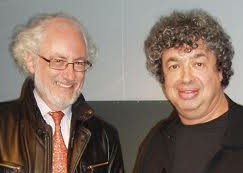
The Rheingau Music Festival’s 2014 prize, worth 10,000 Euros, has been awarded to the German conductor and pianist Christoph Eschenbach.
Well, he’s had a tough year, being kicked around by critics and orchestras from here to kingdom come.
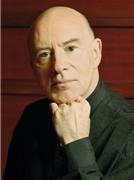
We have received the following disturbing report from Germán Clavijo, a viola player in one of the London orchestras, who is starting a career as a conductor.

Germán took part in the II International Conducting Competition in Cordoba last weekend and reports grave irregularities in its procedures. Here is his report. We await a response from the authorities in Cordoba.
The rules of the competition are deliberately ambiguous. Rule 3.2 states that the panel will be formed by the Principal Conductor of the Cordoba Orchestra, the Orchestra as a whole and the Chief Conductor or Artistic Director of the Orquesta Sinfónica de Sevilla, Filarmónica de Málaga and Orquesta Ciudad de Granada who wish(?) to take part in the panel. This rule was totally ignored.
Seventeen contenders paid a fee of €750 (£600). The competition did NOT provide a panel last Saturday. Lorenzo Ramos, the principal conductor, was the only person there (apart from the orchestra). At 9am Mr Ramos explained how the competition would proceed. It was a total improvisation. He didn’t say how many votes we needed to get to the 2nd round, nor how many of us would conduct in the morning and how many in the afternoon. Although the 1st round of the competition was supposed to be 6 hours long (with two half hours breaks) Mr Ramos managed to get the job done in 3 hours and 45 minutes.
It was up to him to decide how long any person would conduct. There was no Jury, only Mr Ramos, no single member of any other Andalusian orchestra, nobody at all! I personally could only run one of the two Overtures (less than 8′) and independently of how good or bad I might be, there was clearly time -around 17′- for every participant to conduct both pieces (Forza del Destino by Verdi and Zigeunerbaron by Strauss).
In the afternoon session not a single person from the administration was there to supervise. One of the contenders protested in the morning after not been allowed to finish even one overtures and guess what! He was invited to come back in the afternoon and conduct the other piece.
Although the competition took place in the Conservatoire of Cordoba, all the rooms where locked and no one had a room to practice, rest, concentrate. I am sure Fellini would have liked it as an idea for one of his surreal films. I felt robbed and humiliated by the lack of protocol and seriousness.
This abuse should not be tolerated, particularly serious in a public funded institution. This is not revanche because I didn’t get through the 2nd round, this is just not wanting any of my colleagues to have to go through this mediocre and dishonest process.
In any serious competition, all contestants should have the same time in front of the orchestra in order to be fairly evaluated. I paid seven hundred and fifty Euros to conduct 7 minutes, I still can’t believe it!
I have sent a formal complaint to the GM of the orchestra, and to the city Hall and to the Regional Government to record such irregularities, from which I haven’t received any answer yet. Note that this orchestra in completely subsidised with Public funds.
I hope someone takes this claims seriously. Meanwhile let’s be brave and denounce this kind of situation. I will fight for an apology, the cancellation of the competition and the refund of the fees.
UPDATE: The orchestra’s defence can be read here.
The British soprano Rosemary Joshua has been named artistic director of the Dutch National Opera Academy.
Starting in September, she succeeds Alexander Oliver who has led the Academy since 1999.
Holland has one of the fast-growing opera scenes in Europe. Ms Joshua is a much-esteemed soprano at Covent Garden, the Met, La Scala and Munich.

Picture by Ruth Crafer















